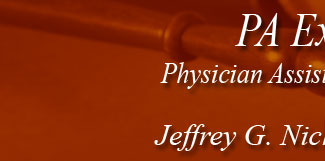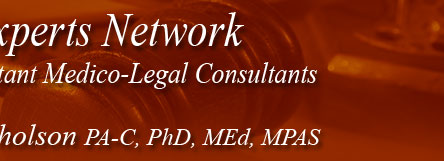The Physician Assistant Expert Witness
& Medico-legal Consultant:
A Guide for Attorneys & Experts
by Jeffrey G. Nicholson, PA-C, PhD
The Physician Assistant Expert Witness Defined
The physician assistant ("PA") expert witness is a board certified and state licensed health care professional who by experience or training is qualified to give an opinion on the standard of care provided by fellow physician assistants. Although formal training is not required, some PA expert witnesses have completed seminars conducted by and for legal nurse consultants. Frequently, as in my own experience, PA expert witnesses are faculty or former faculty at physician assistant training programs. The majority of PA experts get into the practice of providing opinions on malpractice cases because they are asked, not because they set out to become experts.
Physician Assistant Practice Requirements
Physician assistants are health care professionals now licensed in all fifty states to provide medical care under the general direction of a doctor of medicine or osteopathy. In order to become licensed, PAs must graduate from a program accredited by the Accreditation Review Commission on Education for the Physician Assistants (ARC-PA) (www.arc-pa.org) and pass a national comprehensive board examination conducted by the National Commission on Certification of Physician Assistants (NCCPA) (www.nccpa.net). In order to maintain the certification designation, the “C” in PA-C, PAs must complete 100 hours of continuing medical education every two years and receive a passing score on a national comprehensive board exam (similar to the initial certification exam) every six years.
Legal Scope of Practice
PAs are broadly trained in general and primary medical care. They then take this broad-based training into a primacy care practice or into various medical specialties. PAs build upon their general and primary medical care knowledge while employed under the general supervision of a physician in any medical specialty. Although additional formal training is available in some specialties, PAs are not required to hold any additional specialty credential other than that of national certifiation as a generalist PA.
Although physician assistants, by definition and scope of practice, must provide medical care under the general supervision of physicians, they may practice autonomously and at remote distances from their supervising physician. Even so, in most states physicians share in the clinical responsibility and liability of their supervised PA’s clinical decisions and actions. Case precedent differs from state to state, and the responsibilty of the supervising physician for a PA's clinical care and judgement is not without question or absolute.
While the role of PA and physician is similar, each may have a separate scope of practice
defined by training, credential and personal experience. However, it may be quite appropriate for PAs to comment on the standard of care of physicians depending upon the circumstance. The standard of care for the evaluation and treatment of medical illness may be exactly the same for a PA and a physician. For example, the evaluation and treatment of a sinus infection may be the same for a PA and a primary care physician, but may differ between the PA or primary physician and an otolaryngologist specialist.
Physicians are typically and more frequently disallowed from providing testimony on the standard of care of physician assistants, but they may comment on the physician supervisory role and requirements. Most states now require PA expert witness testimony in malpractices cases where physician assistants are involved. A generalist or primary care PA may comment on the standard of care of another PA in any medical specialty if the care involves knowledge that all PAs are expected to possess. Nevertheless, it may be prudent to choose a PA expert witness who has current practice experience in the medical specialty of the PA involved in the civil action.
Physician Assistant Expert Ethical Guidelines
The American Academy of Physician Assistants (AAPA), the national professional association of PAs (www.aapa.org), has recognized the PA expert witness and has adopted ethical guidelines on the use of PAs as expert witnesses in malpractice cases.
Finding Physician Assistant Experts
Physician Assistant expert witnesses may be found by calling Dr. Nicholson or by contacting the AAPA, or the American Academy of PAs in Legal Medicine (AAPALM), a special interest group endorsed by the AAPA (www.aapalm.org). AAPALM provides continuing medico-legal education for physician assistants and resources for PAs who are interested in becoming physician assistant expert witnesses.
Other Information Resources
Another valuable resource for attorneys and anyone interested in PA practice is the Physician Assistant Employment Guide. This free and comprehensive manual, which I co-authored and annually edit, overviews PA education, certification, licensing, scope of practice, and compensation. Finally, a recent published study by Dr. Nicholson (Journal of Medical Licensure and Discipline, Vol. 95, Num. 2, 2009) found that PA malpractice incidence and average payment amount were significantly less than that of physicians and advanced practice nurses between 1991-2007. The study examined the first 17 years of data in the National Practitioner Data Bank (see www.npdb-hipdb.hrsa.gov). For a pdf copy of the article, click here. For a condensed summary of the study, click here.
Jeffrey G. Nicholson is a nationally recognized leader in the PA profession and authority on the standard of care and other legal aspects of PA clinical practice. He has been an actively practicing PA for 19 years and has been in PA academia for over 12 years serving as Assistant Professor, Director of Clinical Education and PA Program Director, most recently at the University of Wisconsin-Madison. He is a Distinguished Fellow of the American Academy of Physician Assistants, President of the American Academy of PAs in Legal Medicine and a longstading board member of the Wisconsin Academy of Physician Assistants. He has completed degrees at Boston College, Harvard University and the University of Wisconsin. He has published articles on PA education, PA malpractice, and PA employment. He leads a consulting firm to support the work of attorneys and insurance companies providing case merit review and expert testimony on the standard of care of physician assistants and nurse practitioners in all medical specialties.
|











